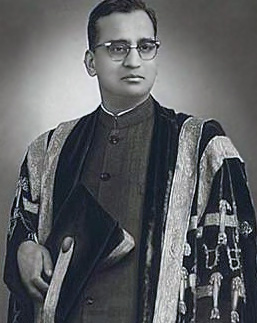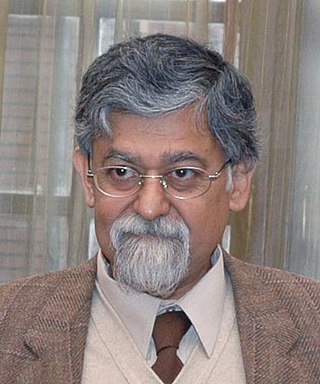
Lars Peter Hansen is an American economist. He is the David Rockefeller Distinguished Service Professor in Economics, Statistics, and the Booth School of Business, at the University of Chicago and a 2013 recipient of the Nobel Memorial Prize in Economics.

Vijayendra Kasturi Ranga Varadaraja Rao was an Indian economist, politician and educator.
Syed Nawab Haider Naqvi was a Pakistani economist and scholar.

Sir Chintaman Dwarakanath DeshmukhICS was an Indian civil servant and the first Indian to be appointed the Governor of the Reserve Bank of India in 1943 by the British Raj authorities. He subsequently served as the Finance Minister in the Union Cabinet (1950–1956). It was during this time that he also became a founding member of the Governing Body of NCAER, the National Council of Applied Economic Research in New Delhi, India's first independent economic policy institute established in 1956 at the behest of Prime Minister Jawaharlal Nehru. After resignation from Union Cabinet he worked as Chairman of UGC (1956–1961). He served as Vice-Chancellor of University of Delhi (1962–67). He was also President of Indian Statistical Institute from 1945 to 1964, Honorary Chairman of National Book Trust (1957–60).

Jayati Ghosh is an Indian development economist. She taught economics at Jawaharlal Nehru University, New Delhi for nearly 35 years, and since January 2021 she has been Professor of Economics at the University of Massachusetts Amherst, USA. Her core areas of study include international economics and globalisation, employment patterns in developing countries, macroeconomic policy, and gender and development.

Mihir Rakshit is an Indian economist, known for his work on fiscal, monetary and other policy, especially issues that concern developing economies. Originally from Chittagong, which is now in Bangladesh, he did his graduation from Presidency College, Calcutta, post-graduation from the University of Calcutta and his PhD from London School of Economics. He taught at the departments of Economics of The University of Calcutta, The University of Burdwan, Presidency College Calcutta, and Indian Statistical Institute Calcutta, as faculty. He also taught at Delhi School of Economics and Erasmus University Rotterdam, as visiting faculty. He served the Reserve Bank of India for two terms as a member of its Central Board of Directors. He was director of the open access quarterly journal Money and Finance published by ICRA Limited from 1997 to July 2016.

Sukhadeo Thorat an Indian economist, educationist, professor and writer. He is the former chairman of the University Grants Commission. He is professor emeritus in Centre for the Study of Regional Development, Jawaharlal Nehru University. He is an expert on B. R. Ambedkar.

Deepak Nayyar is an Indian economist and academician. He is a professor of economics at Jawaharlal Nehru University, New Delhi and Chairperson of the Board of Governors of Centre for the Study of Developing Societies (CSDS) New Delhi. He has taught at the University of Oxford, the University of Sussex, the Indian Institute of Management Calcutta (IIM-C), and the New School for Social Research, New York City. He was Vice Chancellor of the University of Delhi from 2000 to 2005.

Yoginder K. Alagh was an Indian economist and Union Minister of Government of India. He was the Chairman of Institute of Rural Management Anand (IRMA) from 2006 to 2012. He was the Chancellor of the Central University of Gujarat, Gandhinagar.

Sugata Marjit is the former Vice Chancellor of the University of Calcutta and currently the First Distinguished Professor at Indian Institute of Foreign Trade and the Project Director of Centre for Training & Research in Public Finance and Policy (CTRPFP) [A Ministry of Finance, Government of India funded initiative]. He is a Ph.D. at the University of Rochester and currently the Editor of South Asian Journal of Macroeconomics and Public Finance. He used to be the Director of Centre for Studies in Social Sciences, Calcutta from March 2007 to March 2012 and Reserve Bank of India Chair Professor of Industrial Economics at CSSSC till September, 2019. On 15 July 2015 he took the charge as an interim Vice-Chancellor of the prestigious University of Calcutta, Kolkata, India.
Ila Patnaik is an Indian economist. and former Principal Economic Advisor to the Government of India. During this time, she prepared the Economic Survey of India, 2013-14 and contributed to numerous Government of India committees and task forces. In 2014, she was the only female economist ranked within the top ten in India, along with the likes of Nobel Laureate Amartya Sen and former RBI governors Y V Reddy, Raghuram Rajan and Urjit Patel. She also writes regular columns for The Indian Express.

Chakravarthi Rangarajan is an Indian economist, a former Member of Parliament and 19th governor of the Reserve Bank of India. He is the former chairman of the Prime Minister's Economic Advisory Council; he resigned the day the UPA lost power. He is also the Chairman of the Madras School of Economics; former president of the Indian Statistical Institute; the founding chairman of the CR Rao Advanced Institute of Mathematics, Statistics and Computer Science; former chancellor of the University of Hyderabad; and a professor in Ahmedabad University.

Arvind Virmani is an Indian economist and full time Member of NITI Aayog. He was appointed India's representative to the International Monetary Fund in 2009. Prior to that, he was the Chief Economic Advisor to the Government of India.
Mahendra P. Lama is an Indian professor and a development economist who was the pro-vice chancellor of IGNOU and the founding vice chancellor of Sikkim University in India. At the age of 45, he became the youngest vice chancellor of a National Central University in India. He is presently a senior Professor in the School of International Studies, Jawaharlal Nehru University, New Delhi; Chief Economic Adviser in the Government of Sikkim and Member of the Eminent Persons Group on Nepal-India Relations appointed by the Prime Ministers of India and Nepal.

The Institute of Economic Growth (IEG) is an autonomous, multidisciplinary Centre for advanced research and training. Established in 1958, its faculty of about 23 social scientists and a large body of supporting research staff focus on areas of social and policy concern.

National Council of Applied Economic Research (NCAER) is India’s oldest and largest independent, non-profit, economic policy research think tank. Established in New Delhi in 1956, it acquired considerable national and international standing within only a few decades of its founding. It is one of a handful of think tanks globally that combine rigorous analysis and policy outreach with deep data collection capabilities, especially for household surveys.
Santosh Mehrotra is a development economist, whose research and writings have had most influence in the areas of labour, employment, skill development, on the relationship between human development and economic growth, child poverty, and the economics of education. He was an economic adviser in the United Nations system in New York City, Italy, and Thailand (1991–2006), and technocrat in the government of India (2006–2014), apart from making contributions to academic research since the mid-1980s. He has also in recent years established a reputation as an institution-builder in the field of research in India, despite facing difficult odds. He brings a combination of professional experience: with the Indian government as a policy maker and adviser, with international organisations as a technical expert, having lived on three continents and travelled to 63 countries providing technical advice to governments; and as an academic whose research work has been translated into French, Spanish, Portuguese, Italian and German.
Asis Datta is an Indian biochemist, molecular biologist and genetic engineer, known for his research on genetically modified foods and food nutritional security. He was the founding Director of the National Institute of Plant Genome Research and is credited with the discovery of genes that assist in extended preservation of fruits and vegetables. He is a recipient of the Shanti Swarup Bhatnagar Award, the highest Indian award and in the Science category, and was awarded the fourth highest civilian award of the Padma Shri, by the Government of India, in 1999. In 2008, he was included again in the Republic Day Honours list for the third highest civilian honour of the Padma Bhushan.
Madhav Sadashiv Gore (1921–2010) was an Indian social scientist, writer, academic and the chancellor of Jawaharlal Nehru University, Delhi. He was the Director of Tata Institute of Social Sciences (TISS), the vice-chancellor of the University of Mumbai and a recipient of the Life Time Achievement Award of Indian Sociological Society.

V. R. Panchamukhi, is an Indian Economist and Sanskrit scholar. He was born on September 17, 1936, in Dharwad, Karnataka. He is the eldest son of Vidyaratna Shri R. S. Panchamukhi, an archaeologist and indologist and Sanskrit Scholar.













